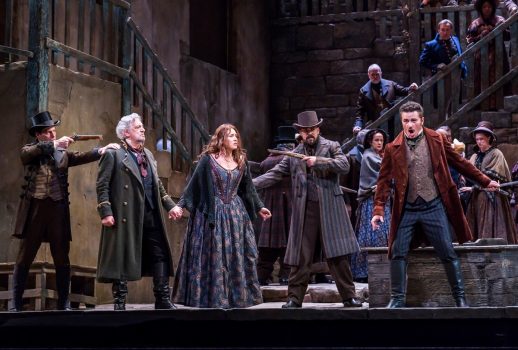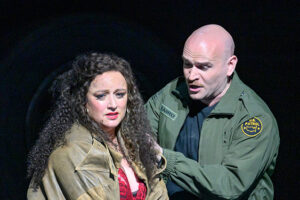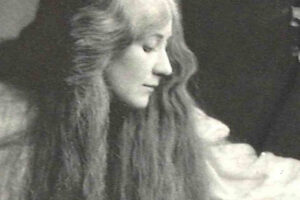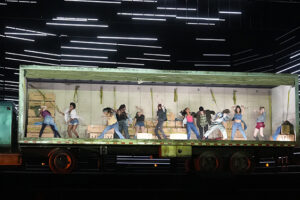
It’s fortunate that the Met’s production of Luisa Miller featured the incomparable Piotr Beczala in the role of Rodolfo. Otherwise it would’ve been difficult to engage with such an unlikable protagonist—narcissistic and petulant to a fault, pulling his lover into his self-destructive mayhem like quicksand.
This, in combination with a cynical plot, which buckles under the weight of its own grief, can make for a severely depressing evening. But, luckily, Beczala made magic out of the gloom, turning in a performance that transformed toxic masculinity into moving tragedy.
Taking its cue from a play by Friedrich von Schiller, Kabale und Liebe, the opera painfully considers the intersections of love and class, revealing dynamics of agency and submission within larger social constraints—who gets to make choices, and who must react to them, as if tossed on a rough and changing sea.
Luisa (sung at this performance with open, guileless grace by Sonya Yoncheva) is in love with Carlo, a sexy suitor with mysterious origins. Her father Miller, while suspicious of Carlo, grants Luisa freedom in her romantic choices. However, when they both discover that Carlo is in fact Rodolfo, the son of local Count Walter, tragic complications unfold.
Verdi’s opera is highly dramatic in a theatrical sense. With a tripartite structure—“Love,” “Intrigue,” and “Poison”—the three-act arc is served very well by the music, the score kicking into gear when required by the text. The composer’s finesse, moreover, manages to elide a number of complicated contradictions in the libretto; the main one being Rodolfo’s violent turns toward his beloved Luisa.
As Rodolfo/Carlo, Beczala managed these emotional, illogical leaps with unwavering ease. His gorgeous tenor embodied perfectly the character’s bold and reckless personality. He made perfect sense of Rodolfo’s violent ruptures, spurring them on as if they were absolutely natural, despite the moral complexity.

There’s something self-indulgent in Domingo’s insistence in continuing in this vein. His particular instrument does not serve the music; which is to say, just because one can sing something, it doesn’t necessarily mean one should. At his best, one was reminded of his former glory days. At his worst, Domingo’s tenorial sound undermined Verdi’s musical intentions—the effect felt especially lopsided during the trio in the final act.
In contrast, Alexander Vinogradov’s performance as Count Walter made for an excellent debut. His booming bass complimented Dmitry Belosselskiy’s similarly hearty performance as Wurm, the count’s co-conspirator.
If there was a weak link, it was the uneven Yoncheva, whose gorgeous soprano and youthful brilliance did not always hit the mark. Her top tended to bleach out the color, underpowered and tentative. Only in the third and final act did she start to hit her stride; here one could see the full breadth of possibility in her Luisa, but even then it was still hit or miss. Perhaps as the run continues, the soprano will find her feet and display more consistency.
As Luisa’s romantic rival, Olesya Petrova presented significant competition with her darkly hued mezzo-soprano . But, while her singing had more aesthetic complication, more distinction than Yoncheva’s conventionally beautiful sound, Petrova failed to evince the character’s ambiguous moral interiority.
Elijah Moshinksy’s production, nearly 20 years old, takes a conservative approach to the material. Working with a color palette of dark earth tones, his solid stagecraft was clear in its storytelling, despite a dearth of creativity. However, his clunky shifts between scenes, transitions from exterior to interior, slowed the opera’s considerable momentum; and the evening dragged when it should have moved swiftly to its tragic conclusion.
Fortunately, Bertrand de Billy’s conducting worked against the production’s lethargy. He led the orchestra with precision, making most of the score’s more bombastic qualities.
Considering the performance as a collective effort, there was, indeed, enough to admire to suggest a more prominent place in the repertory for the opera. Despite Domingo’s miscast presence, and Yoncheva’s hard top, the cast made an effective argument for Luisa Miller’s relevance, its ability to entertain while raising uncomfortable questions about class, gender, and violence
It would be nice to see the opera return again, but maybe this time with a more au courant production to explore the text. There is certainly enough here to consider, and with a qualified cast on hand to serve the material, the current performance hints at all that might be possible.
Photo: Chris Lee / Met Opera























Comments